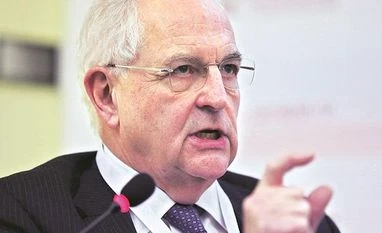At the time of demonetisation, you wrote that its net effect could be gauged only later. Two years down the line, what is your assessment?
I am not persuaded at the moment that it has done any good. It does not seem to me that the shock has given enormous gains. Nor does it seem to have fundamentally changed the course of tax collection, though the same is debated.
There is much talk now about universal basic income (UBI)? Is it workable for India?
The idea is to take away subsidies and distribute it to everyone. If you provide income to everybody, whether they are poor or not, one or two things tend to happen.
Either the income will be very low because you give it to everyone, or will be quite high, which would mean raising taxes a lot.
In other words, there are trade-offs in this scheme. In Indian circumstances, UBI is the ‘least bad’ policy, but I am concerned that it will not give sufficient income to the poor, or may be too costly to implement.
But in India, we are talking of UBI for the poor only.
Then, it is not UBI by definition, even though this is much closer to what I think is sensible. It is like tax credits that we have, but it is not UBI that goes to everybody. Also, targeting the poor is administrative complicated.
In India, states have announced farm debt waivers and there is a pressure on the Centre to announce the same. How do you rate the scheme?
I feel that it makes sense, though structuring it is difficult. Farming is a very risky activity. If things go wrong and farmers can’t pay back these loans, it could force them to sell their land and their families lose their livelihood. Therefore, it (debt waiver) is a risk sharing. I think it makes some sense. Of course, it could become very costly. That way, you can’t say that you will write off all the debt, whatever the circumstances.
The consumer price index-based inflation is at an 18-month low, while economic growth is slowing down compared to expectations. Do you think that the RBI’s monetary policy committee (MPC) should cut the policy rate next month?
Yes. It is clear that the MPC is too concerned with inflation. The inflation rate, too, is below the Centre’s target. As the economy is weak, and so is credit growth, it prima facie looks to me that the MPC should be cutting rates.
In a situation where the US Federal Reserve is raising interest rates, will it be prudent for the MPC to cut the rate?
There is a risk. You would clearly expect this to affect the rupee. However, my view is that people are prepared to accept the fact that India’s situation is different and it should be appropriate for the country to respond to the same. This is provided that the government pursues a prudent fiscal policy, inflation remains very low, and that India is seen as a favourable investment destination.
Remember, only the US Fed is raising the rates. The Europeans, Japanese, and the Chinese are not doing that.
To read the full story, Subscribe Now at just Rs 249 a month
Already a subscriber? Log in
Subscribe To BS Premium
₹249
Renews automatically
₹1699₹1999
Opt for auto renewal and save Rs. 300 Renews automatically
₹1999
What you get on BS Premium?
-
Unlock 30+ premium stories daily hand-picked by our editors, across devices on browser and app.
-
Pick your 5 favourite companies, get a daily email with all news updates on them.
Full access to our intuitive epaper - clip, save, share articles from any device; newspaper archives from 2006.
Preferential invites to Business Standard events.
Curated newsletters on markets, personal finance, policy & politics, start-ups, technology, and more.
Need More Information - write to us at assist@bsmail.in
)